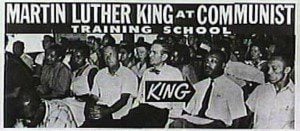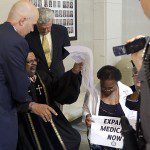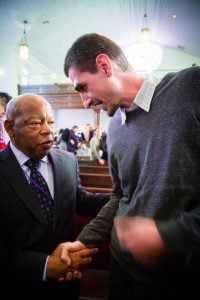This weekend, 47 years after Martin King’s death, America will pause to remember his life and witness. At celebrations in churches, community centers and town squares across the country, many will wax eloquent, remembering Dr. King’s Dream.
Amidst the accolades, it’s also important to remember what people were saying about Dr. King 50 years ago.
 Take, for example, the propaganda, funded by the Governor of Georgia and distributed widely by a national conservative newspaper, The Independent American, in 1965. “Martin Luther King at Communist Training School” was an attempt to discredit King’s work to help America achieve its ideals by painting him as a red anti-American.
Take, for example, the propaganda, funded by the Governor of Georgia and distributed widely by a national conservative newspaper, The Independent American, in 1965. “Martin Luther King at Communist Training School” was an attempt to discredit King’s work to help America achieve its ideals by painting him as a red anti-American.
In 1967, after his famous speech at Riverside Church in which he came out against the war in Vietnam, King was criticized by both white liberals and civil rights leaders for speaking out of turn. Civil rights for African-Ameircans was his territory. Most agreed he should stay out of foreign affairs.
In his personal mail that same year, Dr. King received an anonymous letter, approved by FBI Director J. Edgar Hoover, detailing his personal failings and purported political mistakes. The letter concluded, “As far as I am concerned—and quite a few like me—the best thing that could happen for the Negro people is for you to ‘drop dead.’”
Truth is, many in America didn’t want to hear Dr. King 50 years ago. The Word of the Lord, when it comes to us, isn’t always comforting.
In the Old Testament text for this second Sunday of Epiphany, we find the story about a young Samuel, who was living in the temple at the time with his mentor Eli. When Samuel hears a voice calling his name, he runs to Eli’s bedside. But Eli tells him it wasn’t him. Go back to bed. When the same thing happens again, we can imagine the boy’s fear. A mysterious voice in the dark, calling his name—who could it be? The third time, his mentor gives him some sounds advice: next time, say, “Speak Lord, for your servant is listening.”
Like all the prophets before him, Dr. King showed us that the Word of the Lord can be confusing, unsettling, even scary. The trouble with listening in the dark, of course, is that you cannot see for yourself. But especially for white Christians in America, this is precisely the situation we are in.
A prophetic call for justice is ringing out across the land. It is calling us by name, even, beckoning us to hear.
But for so many of us, we haven’t seen the injustice that #BlackLivesMatter activists are pointing to. Yes, we saw the video of Eric Garner. But we haven’t seen our sons and uncles shaken down repeatedly on the streets. We haven’t seen the fear in our loved one’s eyes when a police officer stops to ask them a question. We haven’t seen neighborhoods where people live under occupation, raided by SWAT teams as in a war zone.
Eli’s advice is especially important for those of us who have not seen. We must stop and say, “Speak Lord, for your servant is listening.”
It’s been almost ten years now since I wrote Free to Be Bound, a book in which I invited white evangelicals especially to listen to the wisdom of the prophetic black church in America. Over the past decade, I’ve continued to listen, trying to hear the Lord’s voice in a community that has suffered the generational trauma of racial injustice. Here are a few things I’ve heard:
1) All faith is political. White evangelicals often worry that focusing too much on justice issues will distract from the heart of the gospel. But black Christians in America have always understood that the promise of salvation applies in this world and the next. The question is not whether we’ll be political, but how.
2) Jesus stands with the powerless. The politics of Jesus are not issue-based or party-based. This world’s system cannot hold the fullness of God’s truth. But Jesus’ political agenda has been clear from the first century to the 21st for those who’ve not been corrupted by power: Jesus stands with the suffering, the excluded, the marginalized and the forgotten. We can only participate in his this-worldly agenda by joining them.
3) No justice, no reconciliation. For white Christians, it is easy to read about Jesus destroying the dividing wall of hostility and assume that historic wrongs should be forgiven for the sake of Christian unity. After all, what’s a little slavery between friends? The problem is that the promise of the gospel as no power to people who’ve seen it denied, over and again. Restorative justice is always about repairing the harm that’s been created by past injustices in order to build trust for a future together. Apart from seeing this work, most black Christians aren’t very excited about reconciliation.
4) Christian love means sharing power. When you’re used to being in control, it’s hard to imagine what it feels like to live with a double-consiousness, always thinking both about how things seem to you and how they must seem to white people. It’s taken a lot of listening for me to hear what’s not being said in so many conversations. But this much is clear: if white people want to reconcile with our black sisters and brothers, we’ve got to talk about how we’re going to share the power we’ve assumed—both in the church and in society. As hundreds of congregations come together across racial lines to celebrate Dr. King this weekend, this might be a good conversation starter: what are white congregations willing to give up in order to see racial justice in America?











